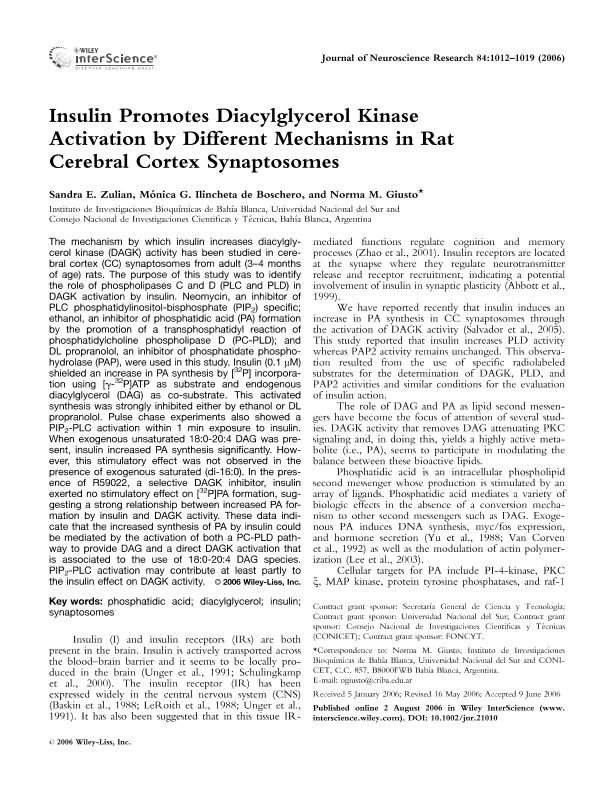Artículo
Insulin promotes diacylglycerol kinase activation by different mechanisms in rat cerebral cortex synaptosomes
Fecha de publicación:
02/10/2006
Editorial:
Wiley-liss, Div John Wiley & Sons Inc
Revista:
Journal of Neuroscience Research
ISSN:
0360-4012
Idioma:
Inglés
Tipo de recurso:
Artículo publicado
Clasificación temática:
Resumen
The mechanism by which insulin increases diacylglycerol kinase (DAGK) activity has been studied in cerebral cortex (CC) synaptosomes from adult (3–4 months of age) rats. The purpose of this study was to identify the role of phospholipases C and D (PLC and PLD) in DAGK activation by insulin. Neomycin, an inhibitor of PLC phosphatidylinositol‐bisphosphate (PIP2) specific; ethanol, an inhibitor of phosphatidic acid (PA) formation by the promotion of a transphosphatidyl reaction of phosphatidylcholine phospholipase D (PC‐PLD); and DL propranolol, an inhibitor of phosphatidate phosphohydrolase (PAP), were used in this study. Insulin (0.1 μM) shielded an increase in PA synthesis by [32P] incorporation using [γ‐32P]ATP as substrate and endogenous diacylglycerol (DAG) as co‐substrate. This activated synthesis was strongly inhibited either by ethanol or DL propranolol. Pulse chase experiments also showed a PIP2‐PLC activation within 1 min exposure to insulin. When exogenous unsaturated 18:0‐20:4 DAG was present, insulin increased PA synthesis significantly. However, this stimulatory effect was not observed in the presence of exogenous saturated (di‐16:0). In the presence of R59022, a selective DAGK inhibitor, insulin exerted no stimulatory effect on [32P]PA formation, suggesting a strong relationship between increased PA formation by insulin and DAGK activity. These data indicate that the increased synthesis of PA by insulin could be mediated by the activation of both a PC‐PLD pathway to provide DAG and a direct DAGK activation that is associated to the use of 18:0‐20:4 DAG species. PIP2‐PLC activation may contribute at least partly to the insulin effect on DAGK activity.
Archivos asociados
Licencia
Identificadores
Colecciones
Articulos(INIBIBB)
Articulos de INST.DE INVEST.BIOQUIMICAS BAHIA BLANCA (I)
Articulos de INST.DE INVEST.BIOQUIMICAS BAHIA BLANCA (I)
Citación
Zulian, Sandra Edith; Ilincheta, Monica Graciela; Giusto, Norma Maria; Insulin promotes diacylglycerol kinase activation by different mechanisms in rat cerebral cortex synaptosomes; Wiley-liss, Div John Wiley & Sons Inc; Journal of Neuroscience Research; 84; 5; 2-10-2006; 1012-1019
Compartir
Altmétricas




